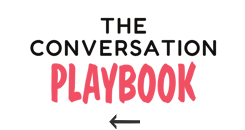A lot of people struggle with social situations, but not because they lack effort or care. It’s because most communication advice is either too abstract, too simplified, or just... doesn’t translate into real life.
You’ve probably heard things like:
🗨️"Just be yourself."
🗨️"Act confident!"
🗨️"Ask better questions."
That’s great in theory, but what does that actually sound like when someone makes a weird joke? Or when you need to repair trust after you've said the wrong thing? These clichés reduce conversation to a performance. They don't teach you how to handle the moments that actually build (or break) trust and rapport.
Most people aren't lacking motivation; they're lacking concrete, adaptable models – real-life examples and frameworks that show you how to respond in various situations, whether it's navigating awkward silences or responding to teasing, all while still feeling like you.
Most books, podcasts, and creators talk about why it’s important to be empathetic, confident, or authentic, but they rarely show what that sounds like in the moment. It’s like telling a complete beginner in a foreign language, "Just act like you know the language. You'll eventually figure out how to speak it." Without learning how to build full sentences, the advice just isn’t usable.
When it comes to real conversations, people are asking things like:
• “What do I say when a friend is venting, to show I’m on their side?”
• “How can I give critical feedback without burning a bridge?”
• “How do I repair trust after I’ve said the wrong thing?”
• “How can I make a joke without being offensive?
What they often get back is: vague pep talks, tips that only work if you're super outgoing, or a therapy-style breakdown that feels too clinical. And sometimes, it’s worse. People get shamed with things like, “If you can’t do these three things, that’s on you.” That kind of advice just makes things harder.
For someone who already feels unsure, vague advice can feel like getting empty encouragement instead of real help. It’s frustrating and can even be discouraging. You don’t need to fake it, own the room, or try to figure out what the 'act' is. You just need tools that feel real to you.
We’re here to help with exactly that - with The Conversation Playbook.

What's Our Mission?
Ever walk away from a conversation feeling like you missed a chance to bond?
Or worried that what you said might have damaged trust?
You’re not alone - and it’s not your fault.
A Note From The Creator: I get it. I’ve been there. Freezing in social situations, struggling with what to say to people - just wishing for something more practical than the usual vague advice. That’s why I created this system.






Communication
Advice Fails You

Build Genuine
Connections?
The Conversation Playbook is built around helping you find your voice, not someone else's, so you can build relationships based on authenticity and mutual respect, not just pleasantries.
We believe true confidence in conversation comes from having tools that align with who you are, allowing you to build trust and deepen rapport naturally.
If something already works for you - great, keep doing it. But if you’ve ever felt unsure how to respond in a moment, these cards are here to help you find your footing, without needing to perform or pretend.
Because you don’t need to be perfect. You just need a jumping-off point for real rapport building.

Why We Created
The Conversation
Playbook
From The Creator:
For me, it wasn’t just reading advice. It was actively working through conversations, step by step. I once heard someone say, “Study conversations the way you would any subject, like math or science.” That stuck with me.
The truth is, these flashcards started as something I made for myself. It took a lot of therapy, practice, and years of fumbling to understand what worked and why. I spent countless hours observing how people interacted and taking notes on what built rapport and what eroded trust.
As a professional with a background in Human-Computer Interaction, which is the study of how people interact with systems, my HCI training taught me to design for real human behavior and not just ideal scenarios. I wasn’t just looking for good advice; I was working to build a system of conversation, a tool that would actually help me and others navigate the real-life moments that define our relationships.
That’s why I created this system. Not just for people like me who needed something more actionable, but for anyone who wants to build stronger, more trusting connections. These cards are the toolkit I wish I’d had, so you can spend less energy worrying about what to say, and more being present in the moments that matter.





